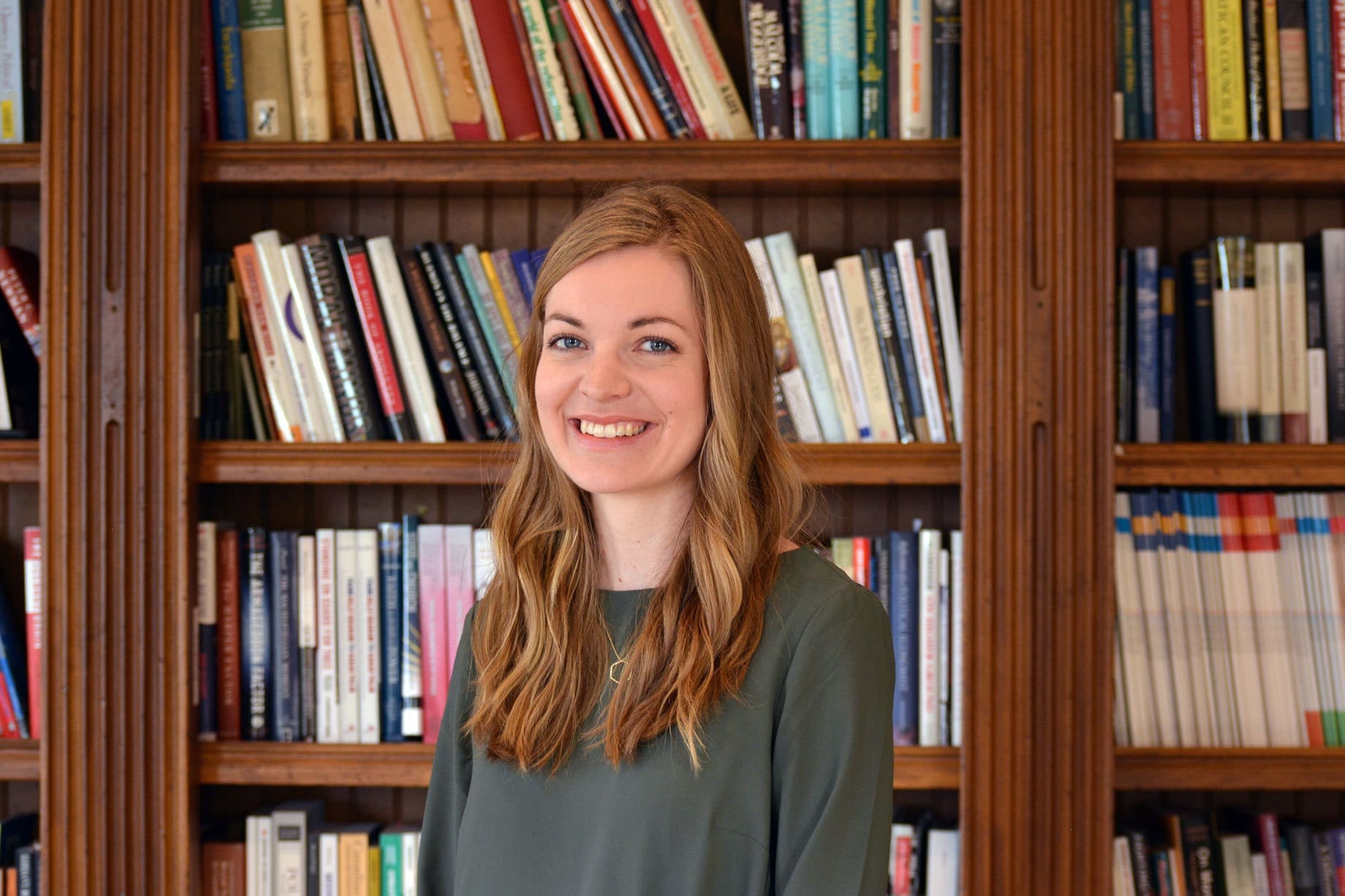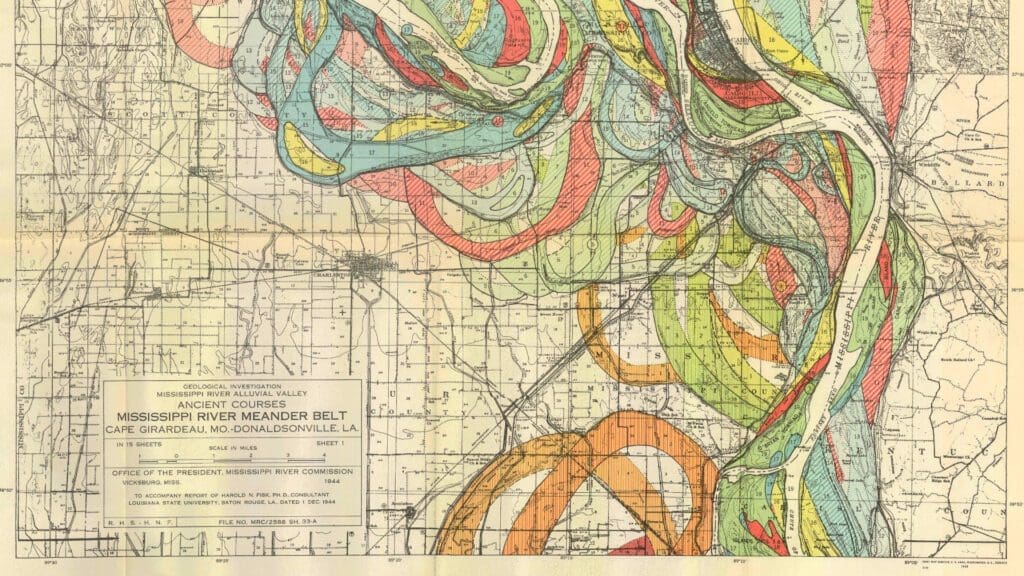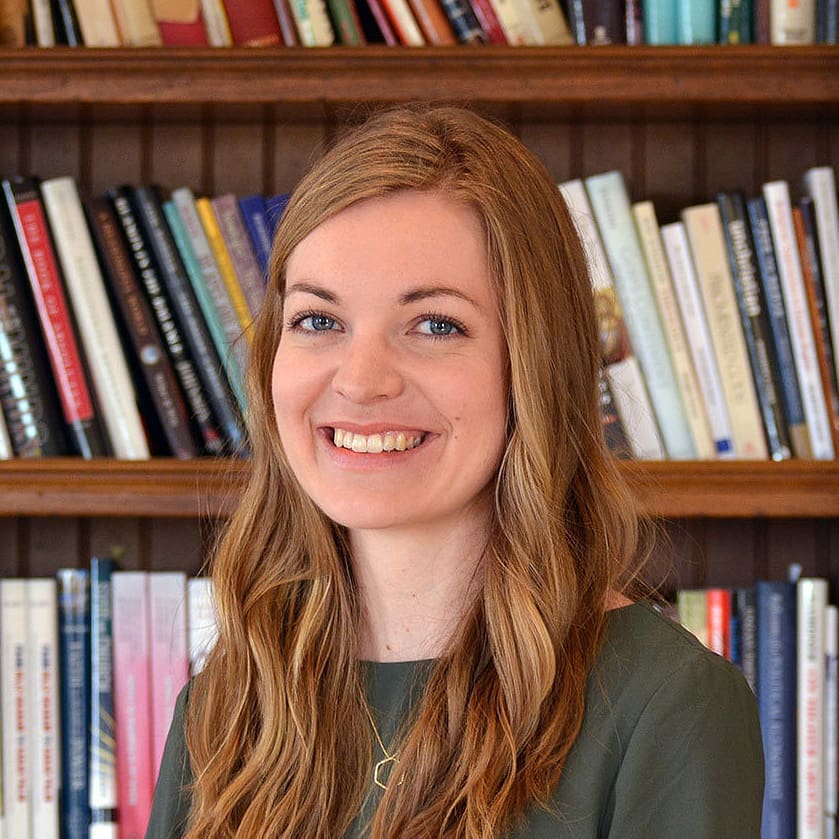
Heidi Deddens: In poetry more than other forms of writing, we’ve retained a sense of the oral nature of language—both in the sense of O-R-A-L and also A-U-R-A-L, speaking and listening. You’ve said before that poetry cares about the sound of language as well as the meaning. How are those two connected?
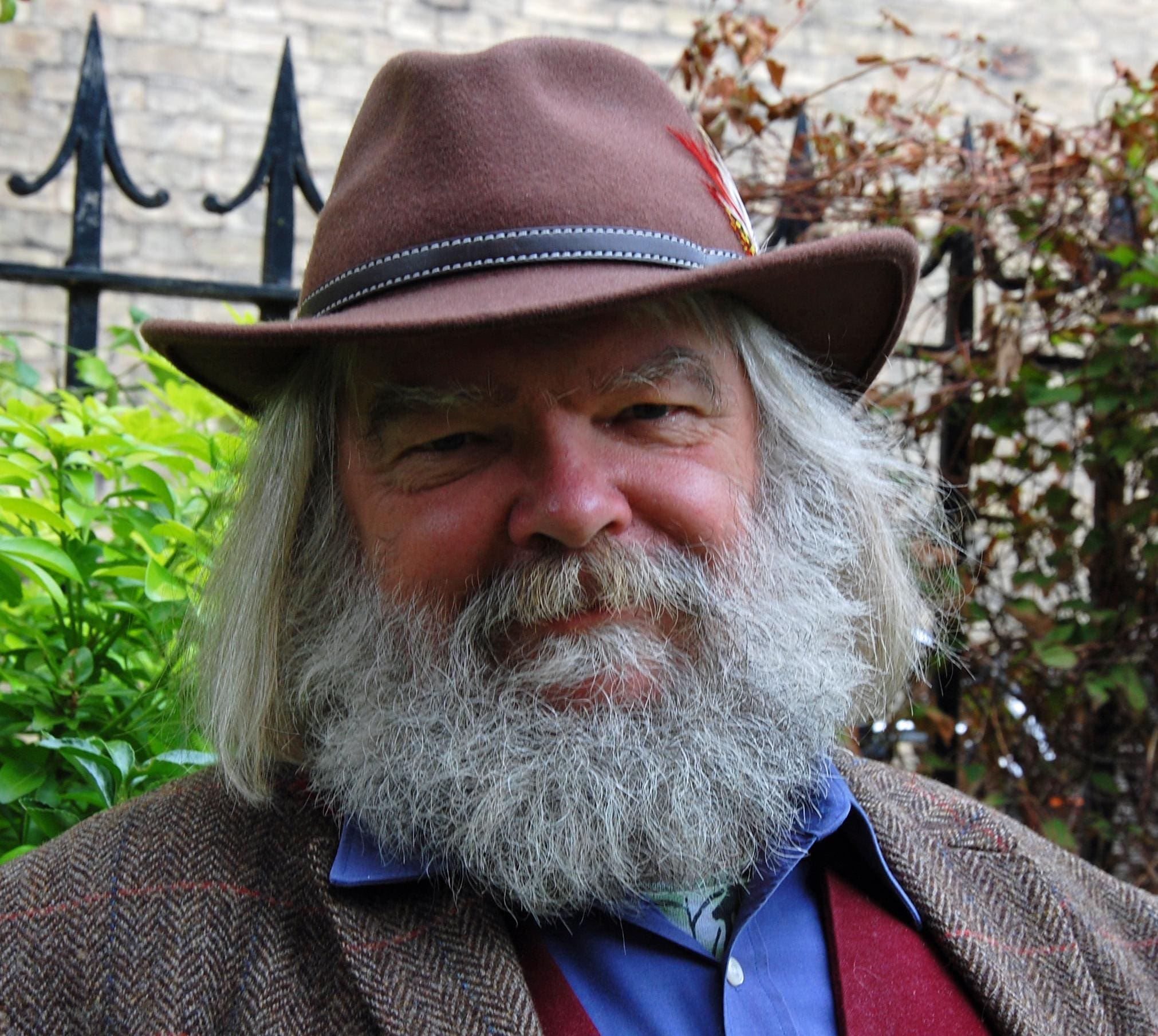
Malcolm Guite: I think poets are always enchanted by the sound of the language they use. And indeed, the word “enchant” tells you something straight away, because “enchant” has the word “chant” inside it. Of course, all culture—all of what we think of as literary culture—wasn’t literary culture at all before the invention of writing. It was oral culture. And one of the reasons people believe poetry has rhythm and rhyme and certain set patterns was partly to do with making it memorable, because it couldn’t be written down.
When poetry eventually made the migration from the tongue to the page, it didn’t lose its heritage; it kept that care for sound. A nineteenth-century French poet, Verlaine, has a poem about poetry that begins with the words de la musique avant toute chose. Music before everything. I was kind of riffing on that line when I wrote the line “Stay with the music, words will come in turn” in my own poem “The Singing Bowl.”
Even unrhymed poetry—certainly classic unrhymed poetry—has a pattern of beats to it, called meter. And each rhythmical unit is called a foot. There are different kinds, but the most common one in English is called an iamb. The iamb is an essential metrical unit, because it goes, ba-doom, ba-doom.

HD: It’s almost like a heartbeat.

MG: Exactly, you got there before I did. I’m sure it is in fact the heartbeat. That’s the first music we hear; it’s music we hear before we ever have ears.

HD: Rhythm is a bodily thing—but even beyond rhythm and sound in poetry, language is physical and embodied. Speaking is a physical process, though as you mentioned we’ve often lost sight of that when we think about language because we’re such a literate, written culture.

MG: Moving it from the tongue to the page also had the effect of moving it from the heart to the head. Especially once you’ve got the phenomenon of silent reading—which is quite a late development after the development of letters themselves. There’s a lovely bit in Saint Augustine’s Confessions, when he finally goes to see Ambrose in Milan. He’s told that Ambrose is reading in his cell, and Augustine is really surprised that he can’t hear anything. He looks in, and there’s the saint, with a slight tremor of movement on his lips but no sounds. Augustine is astonished. He didn’t know you could do that. He thought you must say it out loud.
Of course, there are advantages to mental reading, especially if you’re in a crowded library. But there is a loss as well. And I would count it as one of the characteristics of good poetry that you cannot read it silently, that you end up forming it on the lips.
You mentioned embodying, and it’s interesting that that is the word that Shakespeare uses in that famous passage in A Midsummer Night’s Dream, when he gives what I think is his key account of what poetry is. He starts with a glance, but he moves to mouth and body and shape and form. He says,
The poet’s eye, in a fine frenzy rolling,
doth glance from heaven to earth, from earth to heaven.
And as imagination bodies forth
the form of things unknown, the poet’s pen
turns them to shapes, and gives to airy nothing
a local habitation and a name.
Shakespeare’s art, the art of the playwright, was literally bodied forth in the sense that an actor embodies the words (and embodies them differently in every performance of the play). It’s a particularly rich medium. But I certainly feel that poems don’t really live on the flat page. They only live when they’re breathed and kindled into life by a reader.

HD: Can we talk about the embodied nature of knowing? Mark Johnson, in The Meaning of the Body, writes that “meaning grows out of our organic transactions with the environment . . . our bodies are the very condition of our meaning making and creativity.” How do you think about that in your work?

MG: You’re right to talk about embodied knowing. This was observed a long time ago by Aquinas, who wrote, “There is nothing in the intellect that wasn’t first in the senses.” That’s true even of the most abstract ideas. If you, for example, say that something is transcendent, the metaphor that’s embodied and embedded in the language is of one thing being above another thing. You’re thinking physically, even when you think you’re thinking abstractly.
The more you pay attention to the metaphors you’re using, the more you realize that everything begins bodily. The magical thing is that it then becomes metaphorical. We see a tree, and we’re astonished at its roots and branches and the way it develops. But then, the very physicality of the tree as we’ve known it through our senses becomes a metaphor that allows us to speak about thought itself: that thought itself has branching patterns. To speak about traditions: that they have roots, but that the roots might need to be renewed. To look at whether something bears good fruit or bad fruit: you shall know them by their fruits, says Jesus.
To say that knowledge is of the senses and is embodied is not to diminish knowledge or make it entirely unreliable or contingent. It’s actually to say that we’ve been given an entire cosmos to think with. Everything that happens out there is capable of expressing what goes on in here.
Samuel Taylor Coleridge used to say that he went to his friend Humphrey Davies’s chemistry lectures “to increase my stock of metaphors.” And again years later, the poet T.S. Eliot was trying to write about how poetry actually works and what role the mind of the poet has. He uses the idea, drawn from chemistry, of a catalyst. When you combine H2O and SO3 in the presence of a pure piece of platinum and you get H2SO4, you make sulfuric acid. But the platinum is not diminished. It’s not one of the original parts; it’s not in the beautifully created new solution. And yet the synthesis wouldn’t have happened if the platinum hadn’t been there.

HD: You mentioned the poet taking different forms and using them in new ways. Your own poetry relies a lot on structure and form. I’m wondering if you connect this to the physicality of the incarnation. Is there a relationship between the two?

MG: Yes, I think there is. We should return to that phrase of Shakespeare’s, “Imagination bodies forth the form of things.” The word “bodies” comes before the word “form.” Of course, a body is a form. You can’t have a formless body; a body must have form and limit, and knowing our limitations of form is the essence of what it is to be an embodied person.
But I want to reflect still on that word “bodies.” When I came to write Faith, Hope, and Poetry, I began to reread classic works in light of the revelation of Christ, and suddenly that passage in Shakespeare came alive in a completely new way. I would be willing to wager that Shakespeare knew both the creed and the Gospels well, and that he was riffing on the prologue to John’s Gospel. He sets up this relation between heaven and earth, earth and heaven. He also sets up the idea of imagination apprehending and reason comprehending, which comes down to this bodying, this name, this local habitation. It seems to me that’s very much following the pattern of the prologue of John, where you start with something apparently disembodied and glorious: “In the beginning was the Word, and the Word was with God, and the Word was God. The same was in the beginning with God, all things were made through him, without him nothing was made.” (And of course, the Greek word for making there is poiein, from which we get the word “poet.”) “In him was light, and the light was the life of men, and the light shines in the dark.”
This is wonderful, but you’re also thinking, “Well, yeah, but where do I come in? It’s kind of all going on up there.” And then suddenly you get this extraordinary thing in verse 14 when he says, “And the Word was made flesh and dwelt among us. And we beheld his glory, full of grace and truth.” That is imagination, heaven to earth, earth to heaven, bodied forth.
I think Shakespeare is suggesting that every act of poetic incarnation—the bodying forth of meaning into the form of a poem, whereby the poem itself becomes the local habitation in which meaning can be found—every time that happens it’s an echo of that great fundamental making of the Word flesh, bodying forth in Jesus, and it’s made possible by that.
Shakespeare would almost certainly have known the Vulgate, the Latin translation of the Bible. In John, that first question of the disciples to Jesus (which is so important because it’s an echo of God’s first question to us in Genesis, except the other way around) in the Latin is “Where is your habitation?” And there’s Shakespeare going, “a local habitation and a name.” There’s something profound there.
The Word being made flesh is a self-emptying. It’s a deliberate limitation. Although he was found in form equal to God, he did not cling to equality with God, but emptied himself, taking the form—important word—of a servant. Jesus is able to do what he does precisely because he willingly accepts the limitations of his flesh. And it’s my experience, as a poet who loves form, that there is a freedom and concentration of power to be found in form.

HD: Is this relationship between the incarnation and language most visible in poetry, or only visible in poetry? Poetry has a specific form, but what about language more broadly, language that is used in ordinary ways every day? How does Christ being the Word made flesh relate to that sense of language?

MG: Well, there’s a sense in which every time we say anything we’re trying to body forth a meaning. But for the most part, the language is transparent.
Linguists make an interesting distinction between transactional language and expressive language. If I write a note to the milkman that says, “Three pints tomorrow please,” that’s transactional language. I really only want one thing to be clear in each of those words: I want him to understand that I want three pints tomorrow. I don’t want him to go, “Ah, three. This is an interesting allusion to the Trinity, and of course tomorrow is the eschaton.” I could write an eschatological poem about the Trinity, with the words “three” and “tomorrow” in it, but it wouldn’t be the note to the milkman.
There’s a perfectly proper place for an embodiment not in the deepest and richest sense of an infinite soul embodied in the form of a finite body, which is what God has done with you and me. Your soul is of greater depth and height than your body, and yet it’s bodied forth in you, and mine the same. And of course, the whole of God is bodied forth in Christ: “God was in Christ reconciling the world to himself.” So there is that full embodiment. But we also have to use language for these transactional things, so we reduce it and flatten it for a particular purpose.
The terrible danger, which has been the great mistake of our culture over the last three hundred years, is that having flattened it out, we then mistake the flatness for everything. We forgot that we did the flattening. We reject the other dimensions; we don’t understand the different senses in which it can be spoken. We speed language up, and it becomes this monolinear ticker tape that runs along the bottom of the flat screen of our lives, telling us nothing but what we already know, just shifting bits and bytes of info. We’ve lost this other dimension.
Poetry is unique in that it’s able to restore that lost dimension to language. Just as painting does to what’s done with images and photographs. And music does to what’s been reduced to the mere white noise of our life; music brings a new order and beauty to it. So those arts are not only embodied and expressive, they’re also redemptive. They’re redeeming the rest of the medium in which they’re expressed.
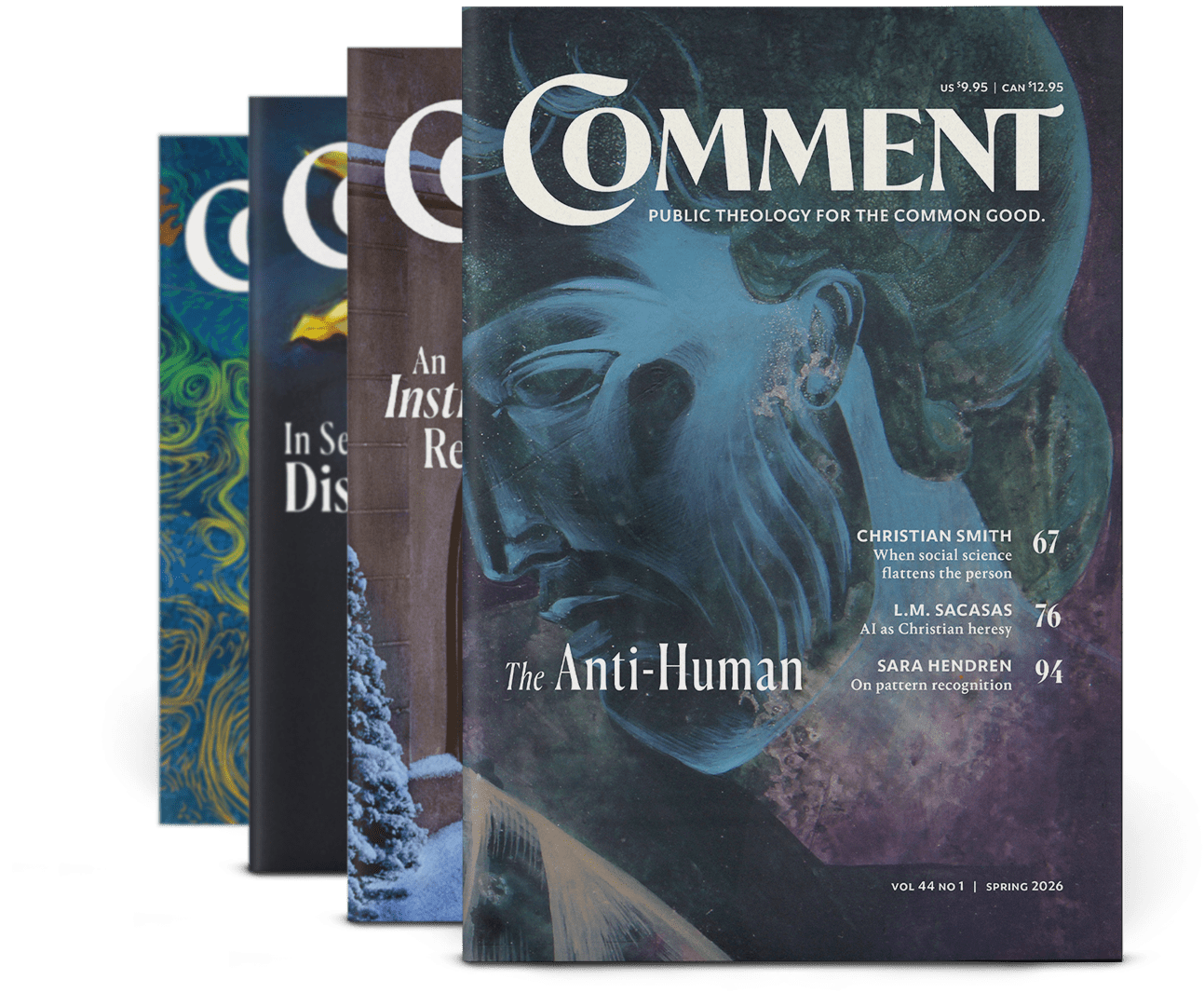
Subscribe now
4 print issues per year + unlimited online access. All for only $24.
Receive our print magazine and get instant digital access to our current issue and our entire archive. Listen to longform essays, bookmark articles, save your reading location, and more.

HD: It’s interesting that you talk about the flattening of language. I’ve been reading Ursula Le Guin’s essays on rhythm lately. She compares rhythm in prose and poetry, and she notes that poetry has more rhythm, in the sense that it has more stress beats. But the prose fiction she analyzes still has a strong sense of rhythm, despite having fewer stressed beats. And then she includes a piece of academic writing that has almost no rhythm whatsoever to it, quite literally in the stresses of the sentence. It’s a very literal flattening.

MG: Very interesting, because you see certain pieces of prose suddenly lifting to the condition of poetry. You can see it, for example, in some of Churchill’s speeches. A rhythm suddenly comes in. Of course, it’s not just rhythm that distinguishes poetry; it’s also extended metaphor and repetition, and all those things.
Ursula Le Guin writes very poetic prose, in the sense that her prose is beautifully raw and in the sense that she is a dealer in symbol. She understands the value of an image whose meaning is greater than she herself may even consciously realize when she employs it—for example, in the Wizard of Earthsea trilogy, the relationship of Ged and the shadow. She also discloses in that book a kind of quasi-magical theology of language itself, with the idea of names summoning out the true nature of things. That’s a quintessentially poetic view of the world.
It’s also a rich theme in Scripture. Right at the core, early on, is that mysterious verse in Genesis where God brings the animals to the Adam, the original person, to see what he would name them.

HD: There’s a French philosopher named Jean-Louis Chretien who talks about that episode as almost a test for mankind in that moment to see how they’ll respond to the animals. It’s in a book called The Ark of Speech, and he’s essentially saying that language is the first ark that was created for the animals, in the sense that they came together like they did with Noah’s ark, and the ark of language is what shelters them in their uniqueness, their specificity, and their diversity. But that ark of speech is not an act of power, of Adam saying, “This is what you will be,” but of hospitality and recognizing their true nature.

MG: That’s very good. And it’s quite literally true in the sense that as long as we have distinct words for things, we have to have a certain amount of respect for them. The naming of things is important. The contemporary nature writer Robert Macfarlane has written a book called Landmarks, where he’s trying to recover and preserve and celebrate all the rich vocabulary that’s specific to different kinds of habitats. He thinks that as long as you just call a piece of bog “bog land,” then you’re going to pollute it and build power stations on it. But if you know the names of every kind of sphagnum moss and grass on it, and somebody’s mapped out the pathways, then it’s easier to protect. It’s been uttered, as it were, into being—brought onto the ark of language.

HD: You’ve talked about oppression being a failure of imagination. The work that Robert Macfarlane does is meant to drawn attention to the ways that we oppress or desecrate the non-human world. And of course oppression of other human beings is also a failure of imagination. What can language do to help repair that? And what happens with our language when our imagination starts to fail? Are there signs in our language that we can see before we start to see that failure of imagination enacted in our actions and our bodies?

MG: We certainly can. We can see language degrading our perception. We can see our perception degrading and the language degrading, and then the degraded language—sometimes the deliberately degraded language—limiting the perception.
There was an acute and harrowing analysis of that by the great linguist and philosopher of language George Steiner. In his earlier and bleaker period he wrote a collection of essays called In Bluebeard’s Castle, where he talks about what was happening to language about the Jewish people in the years around the rise of the Nazis, but also in the decades before. He talked about how frequently language related to vermin and various forms of uncleanness were used about Jewish people or the enclaves in which they lived. So then language of cleansing could be used to euphemize what was in fact cold-blooded murder. But the capacity to perceive the other person as just as fully human as you was already being eroded by the misapplication of language. The language prepared the way for the atrocity that it sought to conceal.
At the time when he was writing that, Steiner was pessimistic. He felt that language was so completely malleable, and the human heart so bent and corrupt, that in a sense language could almost do nothing but oppress and conceal. He took that further in After Babel, his collection where at one point he says—I’m paraphrasing here—“We’re in the islanded citadels of our unreachable, subjective consciousness, surrounded by these high walls. And when we speak, all we do is lob a verbal grenade over the top of somebody else’s battlements, and there’s a dull thud as it goes off with no idea what damage it’s doing.” Which is a bleak view of language. It’s such a bleak view, you think, why would you write a book? Why would you struggle to communicate at all?
But he realized, in the end, the self-contradictory absurdity of writing such a book. And then he wrote the astonishing book Real Presences, where he said, “In the end, every effort to communicate and to redeem and restore language is a wager on the transcendent.” At one point he talks about language like a series of cheques that you write, promising to pay a meaning to the bearer on the demand. And he says if there has to be any currency of language, then somebody or something, some meaning itself, has to be underwriting these cheques. He’s an agnostic Jewish intellectual, so I’m not trying to put words into his mouth, but for a Christian reader, this is so close to the theology of the Logos, the Word behind the words.
I wrote a poem called “O Sapientia” that included this idea about the Word beneath the words. Instead of our trying to manufacture meaning and slap it onto things, we are ourselves a kind of utterance. We are words being spoken. You and I are each a poem of a certain form, not quite finished yet, still being spoken by the poet. And we’re trying, insofar as we have a role in it, not to become an impediment in the speech of Christ. We’re trying to let him finish saying what he started in us.
But anyway, here’s “O Sapientia,” which is riffing on an ancient prayer that goes, “O wisdom coming forth from the mouth of the Most High, running from the one end of the cosmos to the other, mightily and sweetly ordering all things. Veni, come.”
I cannot think unless I have been thought,
Nor can I speak unless I have been spoken.
I cannot teach except as I am taught,
Or break the bread except as I am broken.
O Mind behind the mind through which I seek,
O Light within the light by which I see,
O Word beneath the words with which I speak,
O founding, unfound Wisdom, finding me,
O sounding Song whose depth is sounding me,
O Memory of time reminding me,
My Ground of Being, always grounding me,
My Maker’s Bounding Line, defining me,
Come, hidden Wisdom, come with all you bring,
Come to me now, disguised as everything.
Although it’s about form and restriction, it finishes with “everything.” Everything is then possible.

HD: With the way our digital lives are shaping and changing us, do you think that we’re in danger of losing that sense of being bounded and limited?

MG: Yes, I think so. We’ve created devices that are constantly transcending and pushing the limits of our form, and in that sense doing violence to them. And we absolutely valorize that, we love it. If we want to praise somebody, we say they’re pushing the envelope. If we praise a piece of modern art, we call it transgressive, without realizing this other wisdom of the power and concentration of form.
Of course, it’s been in many ways a great mercy that we can do what you and I are doing now. We’re talking about embodiment in a disembodied way, but at least we’re talking and we can make that connection. But I certainly fear that this pandemic will have accelerated the flight to the ephemeral, the flight to the flat.
I have a blog, and I put all my stuff up there, and I’m glad for people to use it there. But I regard that as a kind of transitus. It’s not where the poetry is actually poetry. In my view, any poetry only becomes a poem when somebody reads it intentionally to a friend or to an audience—to people who are intending to hear it. People who have the eyes of their eyes open and the ears of their ears open, as e.e. cummings says, and are listening with their hearts. Then it has a chance to be a poem. Otherwise it’s just code.

HD: The same thing can almost be said for ourselves in the way we put ourselves online. There’s generally not that conversational or hospitable quality to our online interactions, where there’s someone who comes intentionally seeking to receive us as people.

MG: And then we’re also tempted, because of the glossiness of the age of image, to edit and curate and possibly even Photoshop ourselves. Too late for me. But there’s something sinister about that.
And this is a paradox. We’ve just been talking about the virtues of the body, and the sensual basis of knowledge—moving against the Manichaean tendencies of some Christian theology to divide body and soul and trash the body—we want to love the body. But the world has managed to find a perverted version of even that good thing, which is the cult of the body beautiful, of the utterly perfect form. We’re in a situation now where people are spiritually and mentally oppressed, because they are tyrannized by other people’s ideas of what their own bodies should look like. I think this is a particular oppression for young women—I noticed that as a chaplain—though I know that some men are affected by it too, and obviously people who are living with disabilities are affected by it.
When I wrote my sequence of poems in Parable and Paradox on the sayings of Jesus, I was determined to look at the difficult sayings, the ones that nobody ever really wants to quote, because you think, “Yuck, did he really say that?” Right up there in the top ten awkward things that Jesus said that I wouldn’t want to preach on is Mark 9:43: “And if thy hand offend thee, cut it off. It is better to enter life maimed than having two hands to go into hell.” And I thought, I’ve got to do this. I found that in our context—I’m not trying to talk about how it’s been used in the past—just putting the words “better” and “life” and “maimed” together was quite a radical thing to do.
In the poem that emerged, I finally expressed my vague unease with the cult of the body beautiful as a validation. Of course beautiful bodies are lovely—I delight in human loveliness in all its forms as much as anyone else does. But valorizing it to the point where it becomes the only justification for existence is wrong.
The substitutions for embodiment that we have on Instagram or wherever, though they appear to be about beautiful bodies, are actually fictional. They’re not the warm, peculiar, particular, uniquely shaped bodies of a person we love.

HD: Fictional in the sense of being not just a story, but an untrue story.

MG: Yes, that’s right. Perhaps we shouldn’t degrade the word “fiction” by using it for this. It’s a kind of relational junk food. It’s not the real, nourishing thing, the exchange with someone, but rather a quick-fix substitute that ends up corroding your real appetite.

HD: The language that we use in naming and describing the world says as much about us as it does the world around us. Are there particular trends that you’ve noticed in language over the past number of years? What do you think the language we’re using today reveals about us?

MG: It’s difficult to generalize. But particularly on media like Twitter, which is obviously constrained in some ways, there’s a coarsening and a poisoning of language. What’s going on there is actually exactly the same thing that Steiner pointed out in Bluebeard’s Castle all those years ago, where you dehumanize the other. You “other” them first, and then you dehumanize them.
The failure of imagination that I talked about earlier was in the context of the golden rule. When Jesus says, “Do unto others as you would have them do unto you,” that involves imagining what it might be like to be another person, trying to feel something from their perspective. That’s one of the things that we’ve been given our imagination for. But if we use language in such a way that the other person is no longer a person, then we can’t do that.
But I don’t want to be too pessimistic here, because language is an incredibly beautiful and resourceful gift to us. Just as surely as some politician or advertiser is degrading a word, there’s a poet or a storyteller or a mother with children on her knees, investing words back with their true meaning. It’s always being recovered. As Shakespeare says in the sonnets, “So all my best is dressing old words new, / Spending again what is already spent.” But as he spends it again, the word is given value and currency for centuries.

HD: You’ve talked about failures of language in the sense of people degrading or diminishing language, but are there any frailties or weaknesses that you think are inherent to language? Or any limitations?

MG: Of course. As much as I love language—obviously it’s at the core of my vocation—there’s something always beyond words. The joy of knowing your limits, whether of poetic form or bodily form, is also the joy of knowing that there is a greatness beyond your limits, to which your limits point.
The greatest poets gladly acknowledge the limitations of language as part of the language they use. As Eliot says, “Words . . . / slip, slide . . . / Decay with imprecision . . . / Will not stay still.” Great poetry brings us to the brink of language and points to something beyond. For example, George Herbert’s sonnet “Prayer” gives us twenty-six different images of prayer, which I believe he intended to correspond to the letters of the alphabet, as a kind of alphabet of what prayer is. It is one of the world’s greatest poems, and it ends very modestly: “Something understood.”
C.S. Lewis said something similar in a fine poem of his called “The Apologist’s Evening Prayer,” where he says—about thoughts, let alone words:
Thoughts are but coins. Let me not trust instead
Of Thee, their thin-worn image of Thy head.
From all my thoughts, even my thoughts of Thee,
O thou fair Silence, fall, and set me free.
So there’s a proper limit to language.

HD: Where have you run up against the limits in your own life? Have there ever been times when you’ve felt that language has failed you?

MG: I think we all have times in our life when in domestic circumstances or in relationships we say the wrong thing. And it’s difficult to unsay a thing you’ve said, but sometimes you have to. We find the wrong word unless we spend our time feeling for the right word. But the more you use the right word, the more you know when you’ve used the wrong word. Some people are simply insensitive to language and they say really dumb things, and they don’t even realize it. And sometimes nerves do it.
In a weird way, such is our fallen will: the more we want to say the right thing, the more we end up saying the wrong thing. But everybody can hear the heart behind the words, the music behind the words. And if you mean the right thing but say the wrong thing, it’s never a disaster. It’s when you mean the wrong thing and want to appear to have said the right thing, then you’re in trouble.
We have mistakes and mis-sayings, but we have to own up to our language. We form our own language, but then the language forms us in turn. So I do think we have to take it seriously.

HD: We’ve talked a lot about the relationship between poetry and language, but obviously not everyone is a poet, and yet we use language every day. Is care and responsibility for language primarily a poet’s responsibility? Do you see poets as having a special role as custodians of language? Or does that responsibility fall to all of us?

MG: That’s a good question. The first thing I want to say, just to push back a little bit, is that it’s not quite clear that everybody is not a poet. It’s clear that not everybody writes poetry, and it’s also clear that not everybody who writes poetry writes very good poetry. But what is clear: Anybody who reads and enjoys good poetry—anybody who picks up a Shakespeare sonnet and thinks, “God, that’s great,” or reads a Billy Collins poem and goes, “Wow, I get that”—at that moment of perceiving the poem, they have to be as good a poet as the poet who wrote it. All the poet is giving them is a series of sounds and signs on paper. The magic—the actual imaginative, transformative experience—happens inside us. Every time a poet writes a good poem, they make a thousand poets, because every reader of their poem is, for that moment, also the poet. There’s more poetry in all of us than we might realize.
But to reply to your question more on the terms that you set: While I think poets do have a special responsibility for language, I don’t think they are the only persons who have that responsibility. Every person who uses language has a responsibility for how they use it, particularly for their mode of using it. If you’re a teacher, you need always to be working for the gifts of clarity and encouragement, and you have a special interest in both listening and making good analogies and comparisons in order to bring your students forward. So you have a care for language in that respect. If you are a policeman or a judge, you have a special care for the precision of language. You have to use exactly the right word and not another. There can be no vagueness or ambiguity. So for each avocation, each role within our society, which is a community of language, there are carers and keepers of that bit of language.
Eliot, at the end of the Four Quartets, has an amalgam of various poets speaking to him, including Dante and Blake and Yeats. And they say,
Our concern was speech, and speech impelled us
To purify the dialect of the tribe
And urge the mind to aftersight and foresight.
I think that’s a wonderful account of what it is we’re supposed to be doing. So I do think poets have a special charge to urge the mind to aftersight and foresight, and to purify the dialect of the tribe. But then the tribe itself has to find the language.
There’s a strong argument, which is put forward well by Owen Barfield in Poetic Diction and in other works, that actually all language is the by-product of poetry. To have a word at all, where the sound gestures towards the thing, is a poetic act. And every metaphor that we use, even the dead metaphors that we don’t notice we’re using, were once the living metaphors of a poet. In that sense, poets and imaginative writers are like the tiny little organisms that produce the rich topsoil in which everything else is growing. They’re gradually transforming the fallen detritus of experience into something rich that gives growth again.
